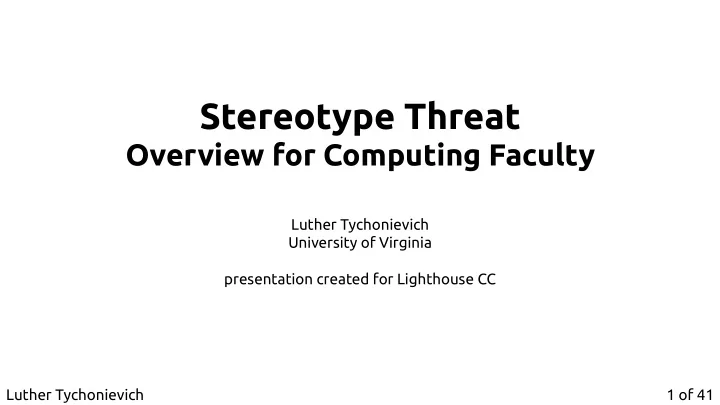

Stereotype Threat Overview for Computing Faculty Luther Tychonievich University of Virginia presentation created for Lighthouse CC Luther Tychonievich 1 of 41
Stereotypes (ST)j • Cause many problems, including… • Manifest in minds of others • Bigotry • Implicit bias • Pidgeon-hole bias • Manifest in mind of student • Imposter Syndrome • Stereotype Threat (STT) Luther Tychonievich 2 of 41
Stereotype Threatj • When you are • aware of • a negative stereotype • about people like you • Then • you perform less well • (whether you believe the ST or not) Luther Tychonievich 3 of 41
Luther Tychonievich 4 of 41
circle regions of color photons Luther Tychonievich 5 of 41
fi sh circle conscious thought regions of color photons Luther Tychonievich 6 of 41
understand understand conscious learn thought working memory ±3 ideas Luther Tychonievich 7 of 41
understand understand I'll fail because conscious thought the ST is right If believed, STT blocks (some) learning and performance Luther Tychonievich 8 of 41
understand understand if I fail, they'll think conscious thought the ST was right If not believed, STT blocks (some) learning and performance Luther Tychonievich 9 of 41
Stereotype Threat – Summaryj • Caused when aware of negative stereotype about you • (dis)Belief not required • Changing awareness can change performance • May remove demographic impact • May invert impact if selection bias present Luther Tychonievich 14 of 41
Avoid myth-bustingj • “it is not true that X are Y ” • conveys “I don’t think it is true… • …but everyone else does” • increases awareness of stereotype • “our highest scorer was X , a Y !” • conveys “it is remarkable when a Y succeeds” Luther Tychonievich 15 of 41
Countering stereotypesj • Provide counter-stereotype evidence • full grade distribution shows threatened students they did well • discussing the contributions of atypical • Express surprise when others raise stereotypes • Don’t lie…people catch on • But don’t accept ST as if expected Luther Tychonievich 16 of 41
Reducing “About Me”j • Don’t invalidate existing identities • “I don’t see X ” insults X s • Help cultivate other identities • e.g., “computer scientist,” “student,” etc. • Identity comes after Interest, Confidence, and Belonging • (see Active Recruiting modules for more) • see also “Mindset” later in this module Luther Tychonievich 17 of 41
Reducing Impactj • Not all students are equally impacted • Studied low-impact categories: • “this test is fair” • reduce belonging uncertainty • affirm personal values • normalize academic struggle • state your confidence in them • believe the incremental growth of intelligence Luther Tychonievich 18 of 41
Intervention: “this test shows no gender difference in results”
Belongingj • Belonging in group is good… • Lack of context about how many friends normal • Asking to list friends increases this stress • Telling them “everyone struggles to make friends” gives that context Luther Tychonievich 23 of 41
Values Affirmationj • Study • give list of values (family, friends, etc) • control: pick least important to you • intervention: pick most important to you • both write why they picked it • (idea: focus on self as distinct from group) • measure performance months later Luther Tychonievich 26 of 41
Providing Criticismj • List what did wrong, preceded by: • positive buffer: “you did well” • high standards: “we expect a lot” • assurance: “we know you can” • High standards & Assurance = “Wise feedback” Luther Tychonievich 29 of 41
Wise feedback: Motivationj
Wise feedback: Perceived Biasj
Wise feedback: Identityj
Growth Mindsetj • Most tasks require some mix of • innate talent • developed ability • The belief that your current tasks are • mostly innate talent . . . . . . . . . . . Fixed Mindset • mostly developed ability . . . . Growth Mindset • Belief itself has impact Luther Tychonievich 33 of 41
Growth Wise Control
Growth Mindset and STTj • Growth mindset tends to • Cause people to continue through hard times (such as acts of bias) • See stereotypes as about who tries • and thus not about me , since I’m trying • (other educational benefits too) Luther Tychonievich 36 of 41
Instilling Growth Mindsetj • Believe it yourself • The part that is learned is your job… • Use growth-centric language • e.g., in praise • “You are X ” (fixed) • “You’ve learned/done…” (growth) • State that intelligence increases with work • explicitly and “see how much you’ve grown” Luther Tychonievich 37 of 41
Classroom Culturej • “Treating everyone like I treat people like me” • does treat everyone the same • does not make all equally comfortable • Example: consider jokes Majorty Minority Get joke happy happy Not get joke bad joke I don’t belong Luther Tychonievich 38 of 41
If you believe a stereotypej • Cognitive Personal Trainer • Still help all (even small, frail minds) become as strong as they can • Stereotype threat is based on awareness • Reducing it (by not raising awareness) still helps them • Also, why is it true? • STT, bias, different opportunities, and… Luther Tychonievich 39 of 41
Unacknowledged Prerequisitesj • Fields tend to assume knowledge • in CS, this includes Spatial Reasoning • = ability to manipulate shapes in head • useful for learning CS • a lot of spatial vocabulary, analogy • stack, tree, address, pointer, nested, … • Correlated with play • FPS video games; construction toys Luther Tychonievich 40 of 41
Action Planj • Many things to do or change: • reduce stereotype-inducing elements of appearance, mannerisms, decor, humor, allusions • remove names & pronouns from examples & assignments • emphasize growth of intellect, in praise and correction • normalize struggle (personal and academic), including sharing your own struggles • express confidence in students • values affirmation activities • Pick a few (high impact, low cost for you) • Revisit often Luther Tychonievich 41 of 41
Recommend
More recommend